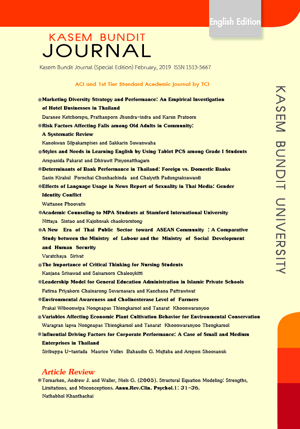Styles and Needs in Learning English by Using Tablet PCS among Grade I Students
Keywords:
learning styles, needs, using tablet PCsAbstract
The study investigated the learning styles and needs of Grade 1 students in learning English by using tablet PCs. The purposes of the study were (1) to investigate the English language learning styles of Grade 1 students who use tablet PCs, (2) to investigate the needs of students in learning English by using tablet PCs, and (3) to find out the effective way to teach English by using tablet PCs in order to respond the students’ learning styles and needs. The samples were 354 Grade 1 students of four schools in the “Integrating Technology to Enhance Learning” pilot project in the academic year 2012. The instruments used for data collection were questionnaires and semi-structured interview. The data revealed that; (1) Grade 1 students learnt English via tablet PCs by auditory, visual, and kinesthetic learning style with 91%, 88%, and 50% respectively. (2) Grade 1 students needed contents to end up with games and activities, listening activities, self-using tablet PCs, and practical activities. (3) The effective way to teach English by using tablet PCs depended on teachers and materials. Teachers should weight the all 3 styles in any step to suit the students and the teachers should adapt themselves to keep up with technology in order to be a leader of students to learn presently and in the future. The materials or contents should be animation with sound and translation. Activities or games should be interactive and they can enhance learning and students can use to revise or study in advance by themselves. The body of the tablets should be larger with clear buttons and easy – used application. In addition, the battery should keep more power for longer using.
References
Grier, A. S. (2005). Integrating needs assessment into career and technical curriculum development. Journal of Industrial Teacher Education, 42, 59-66.
Jeral, K. M. (2010). The Influence of Visual, Auditory, and Kinesthetic Learning Opportunities. (Master of Science in Education), Southwest Minnesota State University.
Kaewpet, C. (2009). A Framework for Investigating Learner Needs: Needs Analysis Extended to Curriculum Development. Foreign Language Teaching, 6(2), 209-220.
Kaur, S. (2007). ESP COURSE DESIGN: MATCHING LEARNER NEEDS TO AIMS. English For Specific Purposes World Journal, 14(1).
Khamkhien, A. (2012). Demystifying Thai EFL learners' perceptual learning style preferences. 3L:Language, Linguistics, Literature, 18(1), 61-74.
Lepetit, D., & Cichocki, W. (2002). Teaching languages to future health professionals: A needs assessment study. In H.M. Long (Ed.) Second language needs analysis. Cambridge: Cambridge University Press.
Long, M. H. (2005). Second language needs analysis. Cambridge: Cambridge University Press.
Martin, A., & Rader, H. (2003). Information and IT Literacy Enabling Learning the 21st Century. London: Facet Publishing.
Ministry of Education. (2008). Towards a learning society in Thailand. Bangkok: Office of the Permanent Secretary.
Ministry of Education. (2012). Policies and strategies on Education Development of the Ministry of Education. Bangkok: Federation of Agricultural Cooperatives of Thailand Publishing.
Pothaworn, A. (2009). A Study of Learning Styles of Indicators of Success of Rajamangala University of Technology Srivijaya Student for Calculus 2 Subject with Differences Mathematics Learning Achievment. (Master Degree), Rajamangala University of Technology Srivijaya, Trang.
Pothisuwan, C. (2005). Adult education:Western philosophy and practice. Bangkok: Kasetsart University.
Preawpairporn, S. (2011). The Role and Duty of Teachers. Retrieved 31 July 2015, from https://www.gotoknow.org/posts/463906
Raenark, S. (2003). The effects of learning styles on English achievement of mattayom suksa 5 students in the school under the department of general education, Petchabun. (Master Degree), Rajabhat Institute Petchabun, Petchabun.
Ryan, T. E. (2014). The Effect of Auditory Integration Training on the Working Memory of Adults with Different Learning Preferences. (Doctor of Philosophy), Capella University.
Yassin, B. (2015). The Academic Effects of Learning Styles on ESL Students in Intensive English Language Centers. ELT and Applied Linguistics, 3(1), 17.
Downloads
Published
How to Cite
Issue
Section
License
ทัศนคติ ความคิดเห็นใด ๆ ที่ปรากฏในวารสารเกษมบัณฑิตฉบับนี้เป็นของผู้เขียน โดยเฉพาะ มหาวิทยาลัยเกษมบัณฑิตและบรรณาธิการ ไม่จำเป็นต้องมีความเห็นพ้องด้วย







